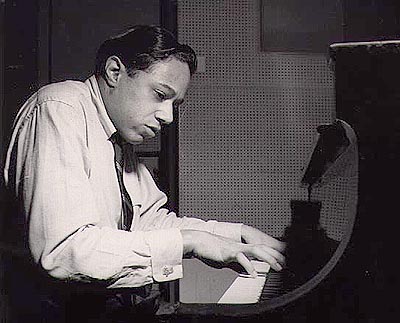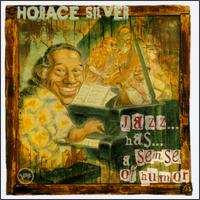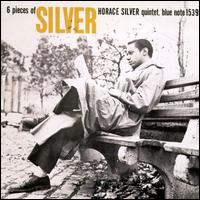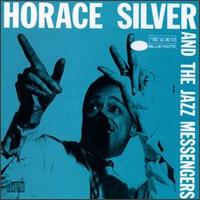
A
FIRESIDE CHAT WITH HORACE SILVER
It's difficult for me to imagine hard bop without Horace
Silver. It is impossible for me to imagine Blue Note without Horace Silver.
And I would wake up in a cold sweat at the mere thought of not having
Six Pieces of Silver, The Stylings of Silver, Further Explorations by
the Horace Silver Quintet, Finger Poppin' with the Horace Silver Quintet,
Blowin' the Blues Away, Horace-Scope, Doin' the Ting (At the Village Gate;
the Tokyo Blues and Silver's Serenade in my less than impressive collection.
So to say that I am a fan does not do Silver justice. Justice, he has
never received from the formal jazz media and anal retentive critics,
that obviously do not have their ear to the ground considering Silver
is a populous favorite. Even as he is but just a few years away from his
75th birthday, the pianist / leader / composer shows no signs of slowing
down. Allow me to give Silver the stage, as always, I bring it to you
unedited and in his own words.
FRED JUNG: Let's start from the beginning.
HORACE SILVER: I took up the piano, merely as a monkey see, monkey do
type of a thing. There was a girl who lived next door to me. We were about
the same age and we used to play together. She had a younger sister and
sometimes we would play with her too. She was pretty young, but me and
this girl, we used to play together. When her dad or mother bought her
a bicycle, I went and I asked my dad for a bicycle. When she got her roller
skates, I asked my dad for them. I tried to copy all the stuff that her
parents were giving her, I asked my dad for. So finally, her brother was
a piano player and he played in some bands around town here locally and
finally, she decided that she wanted to study the piano and so her parents
got her a piano, well, they had a piano actually. So I wanted to play
the piano and do the same thing, copy her. So my uncle worked out in the
country somewhere for these rich white people who were moving to Florida
and they had an old, upright piano that they wanted to get rid of and
so he asked if he could get it and him and my dad found somebody with
a truck and they went out there and got the piano and brought it home
and put it in the kitchen and then I started taking lessons. That is how
I started. After two weeks or three weeks, I got bored with playing scales
and exercises and I told my dad that I wanted to quit, but he said, "No,
you are not going to quit. You wanted this and I got it for you and you
are going to stick with it." He said, "One day, you will thank
me for this." And I do, today, thank him for it. But that is how
I got started. Actually, Fred, I wasn't that much interested in it at
that time. It wasn't until I started being able to read music a little
bit then I would go to the five and ten cent store and buy sheet music
like "Moonlight Serenade" by Glenn Miller and "Stardust"
by Hoagy Carmichael and all of these things that I would bring home and
play to make it a little bit more interesting to me. It wasn't really
until I heard the Jimmie Lunceford band at a local amusement park in Connecticut.
I heard that band one Sunday, me and my dad and that band turned me on.
That Lunceford band, they sounded so good. I just said to myself, "That's
what I want to be. I want to be a musician." I made my dedication
that night. I was about eleven years old at the time.
FJ: What were some of your other listening pleasures?
HORACE SILVER: Well, I used to go to the five and ten cents store at Woolworth
and they had a record section, the old 78 rpm records and I would buy
Tommy Dorsey, Jimmy Dorsey, Count Basie, Slim and Slam, Slim Gaillard,
Slim and Slam, and various other records. Whatever appealed to me, I would
take them home and listen to them and get inspired.
FJ: During your distinguished career, you have played alongside the likes
of Stan Getz, Coleman Hawkins, Lester Young, Art Blakey, Lou Donaldson,
Sonny Rollins, Milt Jackson, Cannonball Adderley, Clifford Brown, John
Coltrane, Miles Davis, J. J. Johnson, Kenny Dorham, and Art Farmer. Does
anyone linger in your memory?
HORACE SILVER: Yeah, well, Miles Davis because I always tell people that
you learn with everybody you play with. They're older musicians. They're
geniuses. They're inspirational and you learn a lot from playing with
them. Either they show you things or else you learn from observing what
they do. But I think I learned the most, from any one guy, and that was
from Miles Davis. We used to live in the same hotel and he used to come
to my room and I had a piano in my room and he would show me some different
chords on the piano and I learned some harmonic voicings from him. Also,
I just learned from watching what he did and being inspired by his great
genius.
FJ: In three decades, during the Fifties, Sixties, and Seventies, you
led well over thirty sessions as a leader for Blue Note Records, not counting
the numerous sessions you appeared on. It almost seems like you were the
house pianist.
HORACE SILVER: Well, Blue Note began long before I came with it, but when
I got with it, it was sort of like a fluke how I got to do my own record
session there because Lou Donaldson hired me to do his record. I did the
first record with Lou and then I did a second record with Lou and then
I was supposed to do a third record with Lou. About three days before
the session, Alfred (Alfred Lion) called me and said, "Well, Lou
can't make it. We've already rented the studio. Why don't you come out
and make a trio session for us." I said, "Great." Luckily,
I had a lot of material and I got a chance to practice for three days
and got my thing together and went onto make this first trio album. That
led to two more trio albums and I did three trio albums and eventually,
I did a quintet album with Kenny Dorham, Hank Mobley, and Doug Watkins,
Art Blakey, and myself and as a result of doing that album, I decided
to make a go out of it.
FJ: That was the OG edition of the Jazz Messengers.
HORACE SILVER: I don't know exactly how long we played together. We didn't
get that much work to tell you the truth, Fred. We worked a few gigs here
and there.
FJ: One would think club owners would be foaming at the mouth to get you
guys onto the bandstand.
HORACE SILVER: Yeah, well, that's the way it was in those days, Fred.
We couldn't get a gig at Birdland for a while there. Nobody seemed to
play much attention to us, the major jazz clubs. But anyway, we stuck
together for a while until the thing dispersed.
FJ: The Horace Silver Quintet has quite an impressive alumni roll. Your
thoughts on Hank Mobley, who appears on Six Pieces of Silver and The Stylings
of Silver.
HORACE SILVER: Oh, a great musician, very underrated. He's one of the
great jazz saxophonists of our time, I think, in my opinion, very creative
and very inventive, always full of ideas, a lot of feeling when he plays.
He is one of my favorite tenor saxophone players, Hank Mobley.
FJ: The late Art Farmer, who appears on The Stylings of Silver and Further
Explorations by the Horace Silver Quintet.
HORACE SILVER: Art Farmer too, another beautiful musician, a wonderful
person. He had such a wonderful style. He was really a stylist on his
horn and Kenny Dorham too. I loved Kenny Dorham's playing. Kenny Dorham
and Hank Mobley together, at that time, when we had those two guys in
the frontline, I think, that was one of the hippest frontlines that I
have ever played with.
FJ: And Blue Mitchell, who along with Junior Cook, made up the frontline
on classics like Finger Poppin' with the Horace Silver Quintet, Blowin'
the Blues Away, Horace-Scope, Doin' the Thing (At the Village Gate), The
Tokyo Blues, and Silver's Serenade.
HORACE SILVER: Oh, Blue was great. Blue had that happy medium. He pleased
the musicians as well as the public. He knew how to get funky and get
on down and rock the house with his playing and he could play hip too
and he could play pretty. He covered the whole thing and had a lot of
feeling. I will tell you, Fred, most of all the trumpet players that came
after him, followed his pattern. He set the style for trumpet playing
in my quintet.
FJ: And Blue's partner in crime, Junior Cook.
HORACE SILVER: Junior Cook, another very fine player, underrated. Jun
was a fine musician.
FJ: As notable as Horace Silver, the pianist and Horace Silver, the bandleader
have been, I have always been more partial to Horace Silver, the composer
with exceptional hits like "The Preacher," "Senor Blues,"
"Soulville," "Cookin' at the Continental," "Peace,"
"Sister Sadie," "Strollin'," and "Song for My
Father."
HORACE SILVER: Well, I never thought they would be, Fred. When I wrote
them, I would say to myself that I hope these at least withstand the test
of time. I hope they don't sound old in ten years or something. But I
listened to some of those records we made ten, twenty years ago and they
sound like they could have been made yesterday. So I always loved to compose.
It is a talent that I discovered I had and I just started going to work
with it. The way in which they come to you is not something that you can
predict. Compositions could be instantaneous. You can get an idea and
spout it all out and play it on the piano and write it out on paper or
put it on a tape recorder. It could be a few minutes and then it could
take you several days or several weeks. It depends on the situation because
sometimes, you get a smidgen of an idea and you can't seem to complete
it. It might take you weeks to complete it and then it might take you
ten minutes, or half an hour, or the rest of the day, or three or four
hours. It is unpredictable.
FJ: Does it become easier as the years pass by?
HORACE SILVER: I would say that sometimes it is easy and sometimes it
is not so easy. Whether it is easy or hard, it is fun. That's the main
thing, Fred. I enjoy doing it. It's fun and when I complete it and it's
good, I am very happy. It is a lot of fun, whether it takes an hour or
it takes two weeks.
FJ: Classic Blue Note albums like Finger Poppin' with the Horace Silver
Quintet, Doin' the Thing (At the Village Gate), Senor Blues, and You Gotta
Take a Little Love have long been deleted and are unavailable for purchase
in the States.
HORACE SILVER: I don't know, Fred. I would say that there is a lot of
stuff that they have on the shelf there that I wish they would re-release,
the Silver 'n series: Silver 'n Brass, Silver 'n Wood, Silver 'n Percussion,
Silver 'n Strings, Silver 'n Voices. All that stuff is on the shelf that
they haven't re-released that. I don't know why, but it is just sitting
there. Several years ago, Michael Cuscuna called me and said that they
were thinking about releasing the Silver 'n series. He thought that some
of it could be remastered. He thought that some of it could have been
mixed better and would I be willing to go into the studio with him and
help him to remix it and I said, "Sure, I would be glad to."
And that was the end of that. I never heard more about it. There is a
lot of stuff there.
FJ: Just as historic as the music of those Blue Note albums are the cover
art, which even today is vanguard. What was the extent of your input?
HORACE SILVER: Well, I approved or disapproved. Like what I'm doing now
with Silveto Productions, who produces Horace Silver for Verve Records,
I come up with the concept for the cover and work with the art department
and the photographers in getting it done. I come up with the concepts,
but in those days, I didn't come up with any concepts. All I did was once
the whoever artist that designed it, did it, then Alfred would call me
and I would go down to the office and take a look at it. Most of the time,
I approved of it, but sometimes I said, "No, I don't like that."
Once in a while, that happened, but very often. Reid Miles was fine. He
did most of the stuff. He did some good work.
FJ: After three decades with Blue Note, you formed your own label, Silveto.
HORACE SILVER: I had the label for about ten years. After I did The United
States of Mind (That Healin' Feelin', Total Response, All), that three-volume
set called The United States of Mind, that particular music that I did
on The United States of Mind, had a spiritual connotation to it. It had
a lot of singing. It had a lot of good solos too. It had more singing
than I've had on records before. I don't know because for some reason,
it didn't sell that well, but I was very keen on doing this spiritual
concept with the music and I knew that, at that time anyway and maybe
even today, but at that time, Blue Note or any other company probably
wouldn't want to go for that concept. So I said that the only way that
I will continue this concept is to do it myself. So I decided to start
my own label.
FJ: That must have been an arduous undertaking.
HORACE SILVER: Yes, it was, Fred. It was very difficult. It was basically
a one man operation and I didn't have any other people signed up. It was
a label with just myself. Although, I did release a Clark Terry quartet
album, which was made from the tapes it was made at a club in Long Island.
It was all pretty difficult. I had to do everything because it was a one
man operation. You had to write the music, arrange it, write it out, rehearse
it, and record it, and then the playback, and then you had to mix the
sound and get the master done. You had to get a graphic guy to design
the cover for you, a photographer, a graphic guy to design the lettering
and the linear notes and things. It was a lot of work. Then you had to
take the master tapes to the plant and have them do the pressing. It was
a lot of stages to go through. But it was good. It was a good experience
for me because it taught me how to be a producer.
FJ: After releasing a handful of albums on Silveto, you recorded It's
Got to Be Funky and Pencil Packin' Papa for the Columbia label.
HORACE SILVER: Right, I was only with Columbia for a couple of years.
We did two records for them and that was it. I wish they would re-release
them because there is some fine music there. You might still be able to
find a few copies that are still available, but it is not re-released.
It is a shame, Fred, because I am proud of that music. Those two records
came out beautifully. Andy Bey sang beautifully on it and so did, on the
other one, O.C. Smith sang beautifully on Pencil Packin' Papa.
FJ: What personality takes precedent, Horace Silver, the composer, Horace
Silver, the pianist, or Horace Silver, the bandleader?
HORACE SILVER: Well, hopefully, I would like to be known for all three
because I'm a pretty fair piano player and I'm a good composer. I'm a
good lyricist and I try to be a good bandleader. And I try to be a good
businessman, for a musician (laughing). I mean, musicians are not always
the greatest business people, but I realized that it is a part of the
business. You have to be involved in the business if you are going to
make out and so I try to be a good businessman as well.
FJ: And the royalty checks are still coming in?
HORACE SILVER: Oh, yeah, yeah. Well, I am so happy, Fred, that these young
musicians are recording a lot of my material, some of the older tunes.
A lot of people are recording my material and so I get checks from various
record companies throughout the country. For the most part, I enjoy all
of it. Occasionally, I hear an interpretation of one of my tunes that
I say that they sure messed that one up. I would say that ninety-five
percent of what I hear, I like what I hear. I'm very honored that they
like the music so much that they would do it. There is a whole lot of
composers out there and a whole lot of good material and to think that
they have chosen some of mine is very gratifying.
FJ: And the future?
HORACE SILVER: Actually, I was scheduled to go to New York in September
to do a new album, but I was ill so I couldn't go. I'm feeling quite a
bit better now. I'm not a hundred percent. I'm quite a bit better. I'm
hoping to get to New York around the spring of 2001 and get in there and
do this album. The music is already all written. It is ready to go.
FJ: Is that going to be another quintet recording?
HORACE SILVER: No, I'm doing something different. I'm not going to say
what it is right now. There is plenty left, Fred, a lot of things that
I want to do career wise, a lot of goals that I want to achieve. There
are things that I have thought about for the last ten or fifteen years,
musical goals that I wanted to try, but haven't had the time or the opportunity
to try to get them to come off. I ain't through yet, Fred. I've got a
lot more to do and a lot more to give to the world.
Fred Jung has been traded to the Atlanta Falcons. Email
Him.



